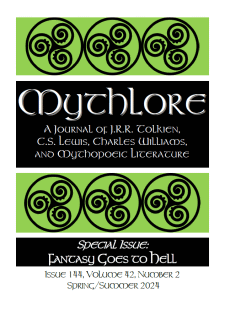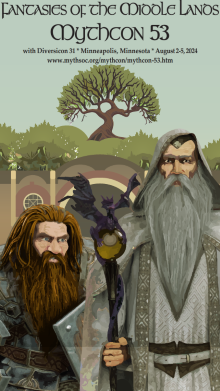Mythlore is a scholarly, peer-reviewed journal published by the Mythopoeic Society that focuses on the works of J.R.R. Tolkien, C.S. Lewis, Charles Williams, and the genres of myth and fantasy.
THE HISTORY OF MYTHLORE
Mythlore was founded in 1969 by the late Glen GoodKnight, Founder of the Mythopoeic Society. He edited its first 84 issues, with the exception of issues 18–23, which were edited by Gracia Fay Ellwood. In its early years, Mythlore was a “fanzine” that, in addition to scholarly articles, columns, and book and media reviews, included a great deal of art work, poetry, and other creative work. Over the years, the articles became more and more exclusively scholarly, and the creative work and fiction reviews moved to sister publications like Mythprint and Mythic Circle. When Dr. Theodore Sherman of Middle Tennessee State University assumed the editorship with issue #85 in 1999, Mythlore completed its transformation into a refereed scholarly journal publishing only articles and reviews. At that time, its format also changed from 8½” x 11” to 6½” x 9”. Janet Brennan Croft, currently of the University of Northern Iowa, became editor in 2006 and switched to a double-issue format with issue #93/94. The journal was published in two double issues per year, in approximately April and November through Spring 2013. In Fall 2013 the double issue numbering was dropped starting with issue #123, and electronic subscriptions became available for individuals.
Current Issue: Volume 42, Number 2 #144, Spring/Summer 2024; special issue Fantasy Goes to Hell (2024)
Editorial Introduction
Introduction to Special Issue: Fantasy Goes to Hell
Janet Brennan Croft and Erin Giannini
Articles
Tolkien, Augustinian Theodicy, and 'Lovecraftian' Evil
Perry Neil Harrison
Substance Abuse: The Symbolic Geography of Hell in The Great Divorce
Richard A. Bergen
Orpheus and the Harrowing of Hell in the Tale of Beren and Lúthien
Giovanni Carmine Costabile
“Hell is only a word. The reality is much, much worse”: Black Holes as Fantasy Gateways to Hell
Kristine Larsen
Hell as an Exploration of Sin: A Comparison of Alan Moore’s Providence to Dante’s Inferno
Zachary Rutledge
Notes and Letters
Dating The Dark Tower
Lee Oser
Whatever Happened to The Princess Bride?: Thoughts for Further William Goldman Research
G. Connor Salter
Some Observations on the Newspaper Reports on Tolkien’s Andrew Lang lecture in 1939
Matthew Thompson-Handell
In Memoriam: Peter J. Schakel
Janet Brennan Croft
In Memoriam: Richard Plotz
Janet Brennan Croft
Book Reviews
Monster Midway: An Uninhibited Look at the Glittering World of the Carny by William Lindsay Gresham
G. Connor Salter
Fantasy: How It Works by Brian Attebery
Glenn Gray
Tarot and Other Meditation Decks: History, Theory, Aesthetics, Typology, 2nd edition by Emily E. Auger
Laurel Stevens
The Inklings, The Victorians, and The Moderns: Reconciling Tradition in the Modern Age by Christopher Butynskyi
Hannah Frances Roux
Essays Triologue: Kepler, Twain, Lewis by Susan Dorman
Sharon L. Bolding
Tolkien in the Twenty-First Century: The Meaning of Middle-Earth Today by Nick Groom
Laura N. Van Dyke
Mystical Perelandra: My Lifelong Reading of C.S. Lewis & His Favorite Book by James Como
Eleanor Knobil
A Joyful Outpost: Exploring the Household Economy of the Beavers from The Lion, The Witch, and the Wardrobe by Aaron Bair
Josiah Peterson
J.R.R. Tolkien's The Hobbit: Realizing History Through Fantasy by Robert T. Tally Jr.
Bianca L. Beronio
Historical Dictionary of Fantasy Literature, 2nd ed., edited by Allen Stroud
Douglas A. Anderson
Briefly Noted

Editor
- Janet Brennan Croft, University of Northern Iowa
- Phillip Fitzsimmons, Administrator of Mythlore and Society Archives, Southwestern Oklahoma State University
- Sarah Gail Croft
- Verlyn Flieger, University of Maryland, College Park
- Charles Huttar, Hope College
- Peter J. Schakel, Hope College
- Rev. John W. Houghton, The Hill School, Pottstown
- Douglas A. Anderson, Independent Scholar
- Donna R. White, Arkansas Tech University
- Christopher Vaccaro, University of Vermont
- Robin Anne Reid, Independent Scholar


